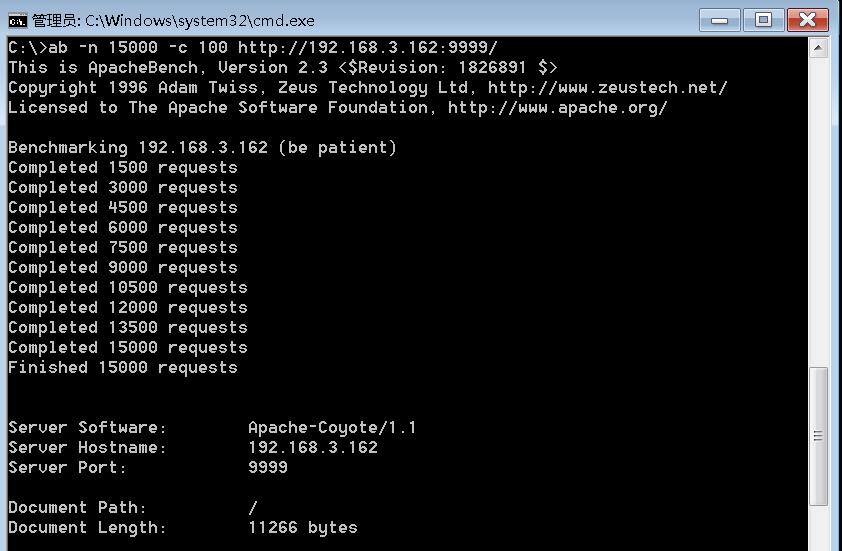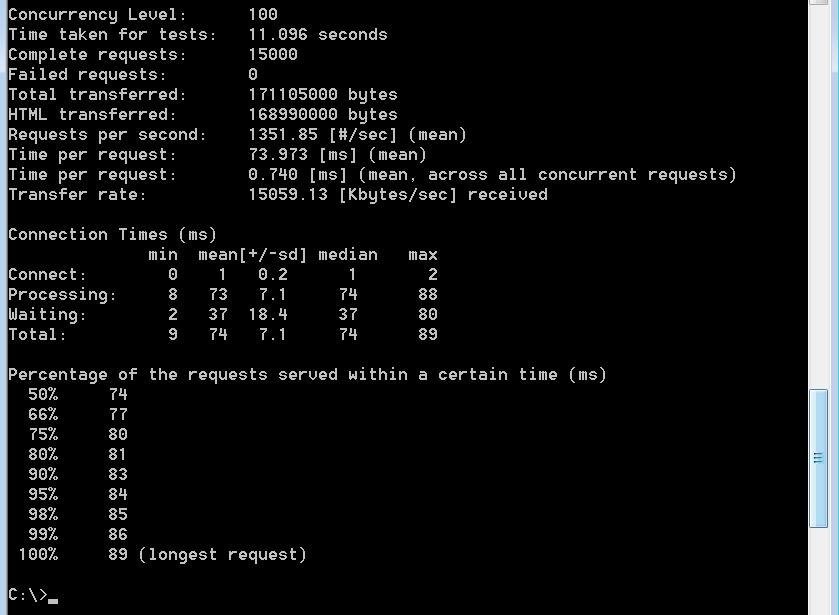Windows 7环境下网站性能测试小工具 Apache Bench 和 Webbench使用和下载
1、简要说明:
Apache Bench 是Apache的网站性能测试小程序,Windows平台下的程序名简称ab.exe,要想获得这个80k的可执行程序,用户需要下载整个Apache Httpd软件包!还需要将其安装到电脑上,确实比较麻烦。
Webbench也是一款网站性能测试小程序,可以获得网站的吞吐率、传送速度等基本性能指标。该程序是在Linux下编程的,在Linux下编译安装使用都很方便,但在Windows 下的程序却没有。
为了方便起见,我将ab.exe 小程序单独拷贝出来,并且下载了webbench的源码,使用CodeBlocks程序和Cygwin64,将源码编译了一下,生成Windows7 环境下可执行的文件webbench.exe ,方便在一个平台下同时使用2个程序,进行网站性能测试。
2、下载地址:
Windows7 64位下的两个网站性能测试小工具下载地址:
链接:https://pan.baidu.com/s/1hDhBlNc4ss_sp-qPYk_kEQ
提取码:upas
3、运行截图:
01-Windows7 64位下webbench测试结果

02-Apache Bench 性能测试小工具-运行参数

03-Apache Bench 性能测试小工具-测试结果1

04-Apache Bench 性能测试小工具-测试结果2

4、测试命令及结果分析
ab.exe -n 15000 -c 100 http://www.abc.com/
# -n 15000总共发送的1.5万个访问请求N个
# -c 100模拟100个用户同时访问C个;
# 结果分析:
# Concurrency Level: 模拟并发用户数(命令行中输入的数据)C个
# Time taken for tests: 完成整个测试的时间T秒
# Requests per second: 服务器性能(在当前并发下每秒能处理的请求数)=N/T个
# Time per request: (mean)从用户的角度计算,每个请求平均花费时间=T/(N/C)
# 解释:每个用户发送N/C个请求,共花费T秒,每个请求平均花费时间=T/(N/C)
# Time per request:(mean, across all concurrent requests)从服务器角度计算,完成每个请求的平均花费时间=T/N
# Transfer rate: 传送速率
webbench.exe -c 100 -t 5 http://www.abc.com/
# -c 100模拟100个用户同时访问;
# -t 5 持续5秒钟测试时间
# 需要测试的网址 http://www.abc.com/ ,注意只测网站名时,结尾要加/
#
# Speed pages/min 每分钟多少个请求, Speed pages/sec 每秒钟多少个请求
# bytes/sec 传送速率
# Requests: 总共完成的请求数
5、注意事项
!!!不要对公共网址发送大量访问请求!!!可用于自己的网站上线前的性能测试。
6、使用帮助
C:\>ab --help
ab: wrong number of arguments
Usage: ab [options] [http://]hostname[:port]/path
Options are:
-n requests Number of requests to perform
-c concurrency Number of multiple requests to make at a time
-t timelimit Seconds to max. to spend on benchmarking
This implies -n 50000
-s timeout Seconds to max. wait for each response
Default is 30 seconds
-b windowsize Size of TCP send/receive buffer, in bytes
-B address Address to bind to when making outgoing connections
-p postfile File containing data to POST. Remember also to set -T
-u putfile File containing data to PUT. Remember also to set -T
-T content-type Content-type header to use for POST/PUT data, eg.
'application/x-www-form-urlencoded'
Default is 'text/plain'
-v verbosity How much troubleshooting info to print
-w Print out results in HTML tables
-i Use HEAD instead of GET
-x attributes String to insert as table attributes
-y attributes String to insert as tr attributes
-z attributes String to insert as td or th attributes
-C attribute Add cookie, eg. 'Apache=1234'. (repeatable)
-H attribute Add Arbitrary header line, eg. 'Accept-Encoding: gzip'
Inserted after all normal header lines. (repeatable)
-A attribute Add Basic WWW Authentication, the attributes
are a colon separated username and password.
-P attribute Add Basic Proxy Authentication, the attributes
are a colon separated username and password.
-X proxy:port Proxyserver and port number to use
-V Print version number and exit
-k Use HTTP KeepAlive feature
-d Do not show percentiles served table.
-S Do not show confidence estimators and warnings.
-q Do not show progress when doing more than 150 requests
-l Accept variable document length (use this for dynamic pages)
-g filename Output collected data to gnuplot format file.
-e filename Output CSV file with percentages served
-r Don't exit on socket receive errors.
-m method Method name
-h Display usage information (this message)
C:\>webbench --help
webbench [option]... URL
-f|--force Don't wait for reply from server.
-r|--reload Send reload request - Pragma: no-cache.
-t|--time <sec> Run benchmark for <sec> seconds. Default 30.
-p|--proxy <server:port> Use proxy server for request.
-c|--clients <n> Run <n> HTTP clients at once. Default one.
-9|--http09 Use HTTP/0.9 style requests.
-1|--http10 Use HTTP/1.0 protocol.
-2|--http11 Use HTTP/1.1 protocol.
--get Use GET request method.
--head Use HEAD request method.
--options Use OPTIONS request method.
--trace Use TRACE request method.
-?|-h|--help This information.
-V|--version Display program version.




